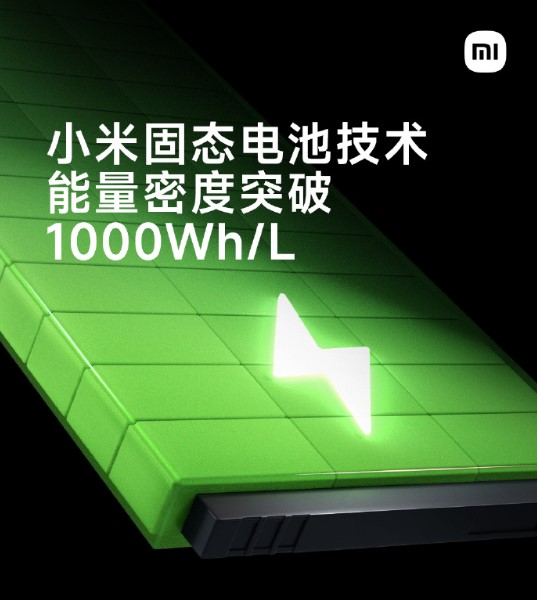Xiaomi, the Chinese electronics giant, has announced a breakthrough in solid-state battery technology that promises to deliver higher energy density, better low-temperature performance, and enhanced safety. The company claims that its pre-developed solid-state battery technology achieves energy density of over 1000Wh/L, a 20% improvement in low-temperature discharge performance, and a significant increase in the acupuncture experiment passing rate.

The main difference between solid-state batteries and traditional batteries is the electrolyte, which is upgraded to a solid state. Solid electrolytes offer better mechanical strength and stability than liquid electrolytes, which are commonly used in traditional batteries. They also have the potential to solve many of the challenges facing traditional batteries, such as low energy density, poor low-temperature performance, and safety issues.
Solid-state batteries have the potential to revolutionize the battery industry, and Xiaomi’s new technology promises to be a game-changer. The company’s laboratory tests have shown that its solid-state batteries have an energy density of over 1000Wh/L, which is a significant improvement over traditional batteries. This means that more energy can be stored in a smaller space, which is critical for mobile devices such as smartphones and tablets. The company packed a super large 6000mAh battery capacity into the prototype of Xiaomi 13 smartphone, significantly improving battery life.
In addition to the high energy density, Xiaomi’s solid-state batteries also offer improved low-temperature performance. At low temperatures, the viscosity of the electrolyte in traditional batteries rises sharply, hindering the transport capacity of lithium ions and resulting in a rapid decline of 60% lithium conductivity. However, solid-state batteries can maintain sufficient lithium conductivity at low temperatures, which means they can perform better in cold environments. Xiaomi claims that its solid-state batteries have more than 20% higher discharge performance than traditional batteries at -20°C, making them suitable for use even in high latitudes.
Another major benefit of Xiaomi’s solid-state batteries is their improved safety. The use of a solid electrolyte can prevent the penetration of lithium dendrites, which can cause short circuits and other safety issues. Xiaomi’s technical team has also developed a method to improve the resistance to acupuncture of its solid-state batteries. By coating the positive electrode with solid electrolyte ceramics, the battery can better withstand needle puncture and prevent the communication between the positive and negative electrodes, ensuring the safety of use.
Overall, Xiaomi’s new solid-state battery technology represents a significant step forward in the development of next-generation batteries. The technology has the potential to significantly improve the performance and safety of batteries and could lead to the development of new innovations for mobile devices and other electronics.
RELATED:
- Xiaomi Buds 4 Pro Appears on TRDA Website, Could Launch Soon in UAE
- Huawei Sues Xiaomi Over Alleged Patent Infringement of Camera and Other Technologies
- Xiaomi Wireless Keyboard and Mouse Set 2 Launched With Improved Design and Longer Battery Life
- Xiaomi 12 Pro Gets a ₹10,000 Permanent Price Cut in India
- Redmi teases 300W Fast Charging, Charges Phone from 0 to 100% In 5 Mins
(Source)







